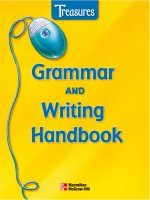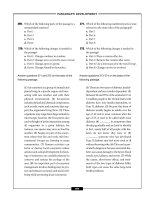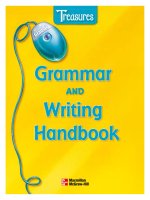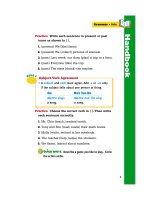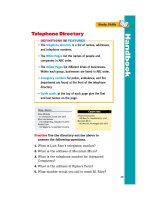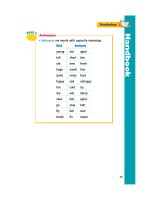treasures grammar and writing handbook grade 4 phần 6 pdf
Bạn đang xem bản rút gọn của tài liệu. Xem và tải ngay bản đầy đủ của tài liệu tại đây (598.42 KB, 28 trang )
Write a story about yourself and a friend. Use the
words ran, hid, camped, and frightened in your story. If possible, use them
in compound predicates.
Q
UCK
WRITE
Q
UCK
WRITE
Combining Sentences: Compound Subjects
and Compound Predicates
Rules Examples
A compound subject contains
two or more simple subjects
that have the same predicate.
Margie went skating.
Jo went skating.
Margie and Jo went skating.
A compound predicate
contains two or more simple
predicates that have the same
subject.
Margie unzipped her jacket.
Margie removed her jacket.
Margie unzipped and removed
her jacket.
Practice Combine sentence pairs by forming a compound
subject or a compound predicate.
1. Kate came to the skating rink. Her brother came to the
skating rink.
2. Nathan works at the skating rink. Nathan practices at the
skating rink.
3. He relaxes on Friday night. He watches television on
Friday night.
4. The skating rink opened at 9:00. The bowling alley opened
at 9:00.
5. Frank is sick today. Frank can’t come today.
Sentences
141
Practice Write the nouns in each sentence. Write whether
each one is singular or plural.
1. The girls made sandwiches for a picnic.
2. Lunch was served under a tree.
3. Two squirrels sat quietly on a branch.
• A singular noun names one person, place, or thing.
Renée bought a beautiful doll.
• A plural noun names more than one person, place, or thing.
Add -s to form the plural of most nouns. Add -es to form the
plural of nouns ending in s, x, ch, or sh.
Customers crowded around the boxes of watches.
Singular and Plural Nouns
• Use these rules for plural nouns:
More Plural Nouns
Rules Examples
If a noun ends in a consonant
+ y, change y to i and add -es.
babies, countries, berries,
skies, puppies
If a noun ends in a vowel + y,
add -s.
monkeys, chimneys, holidays,
highways, boys
Some nouns have the same
singular and plural forms.
deer, sheep, moose
Some nouns have special
plural forms.
men, women, children,
teeth, feet
Practice Write each sentence. Use the plural of each word in
parentheses ( ).
1. Don’t forget to brush your (tooth).
2. (Baby) love to play with (puppy).
3. The (man) and (woman) returned from work.
Nouns
142
• You can combine nouns in a subject.
Mom will have hamburgers. Dad will have hamburgers.
Mom and Dad will have hamburgers.
• You can combine nouns in a predicate.
Jason likes pizza. Jason likes chicken. Jason likes pizza and chicken.
Combining Sentences: Nouns
Write two sentences. In one sentence, include two
nouns in the subject. In the other sentence, include two nouns in the
predicate.
Q
UCK
WRITE
Q
UCK
WRITE
• A common noun names any person, place, or thing. A proper
noun names a particular person, place, or thing. It always
begins with a capital letter.
The professor did some research at Greene Library.
Common and Proper Nouns
Practice Write each sentence correctly. Capitalize the proper
nouns. Underline the common nouns.
1. southwest school is sponsoring a festival.
2. The celebration will be held next tuesday.
• A possessive noun is a noun that shows who or what owns or
has something. A possessive noun can be singular or plural.
The teacher’s book is on the desk. (singular)
The teachers’ lounge is down the hall. (plural)
The children’s pencils are blue. (plural)
Singular and Plural Possessive Nouns
Practice Rewrite each sentence. Use the possessive form of
each underlined phrase.
1. We put the bats that belong to the boys by the fence.
2. The gloves that belong to the children are in the dugout.
Nouns
143
Practice Write each sentence. Fill in each blank with an
action verb that makes sense.
1. Robin some cold water.
2. She a mile-long race through the park.
3. She her face with a towel.
• An action verb is a word that expresses action. It tells what the
subject does or did.
The squirrel dropped the acorns.
Action Verbs
• The tense of a verb shows whether the action takes place in
the present, past, or future.
Verb Tenses
Rules Examples
A present-tense verb shows action
that happens now.
Jackie walks to school
every day.
A past-tense verb shows action
that has already happened.
Jackie walked to school
yesterday.
A future-tense verb shows action
that will happen.
Jackie will walk to school
tomorrow.
Practice Write each sentence. Underline the verb. Then write
present, past, or future to tell the tense of the verb.
1. We will go to Moss Park next week.
2. Denzel showed me his new kayak.
3. He uses the kayak on the lake at Moss Park.
Verbs
144
Practice Write each sentence. Use the correct tense of the verb
in parentheses ( ). The tense is shown after the sentence.
1. Ernesto (clap) after the performance. past
2. His aunt (reply) with a smile. present
Write a sentence about a dog. Use the present tense. Then
write the same sentence in the past and future. Now change dog to some dogs.
Q
UCK
WRITE
Q
UCK
WRITE
• A present-tense verb must agree with the subject of a sentence.
Subject-Verb Agreement
Practice Write each sentence. Use the verb in parentheses ( )
that agrees with the underlined subject.
1. The performance (begin, begins) in a few minutes.
2. His two sisters (wish, wishes) Milo luck.
Rules Examples
Add -s to most verbs if the
subject is singular.
My teacher sings wonderful
songs.
Add -es to verbs that end
in s, ch, sh, x, or z.
The boy watches his former
voice teacher.
Do not add -s or -es if the
subject is plural or I or you.
They love the new song for
the recital.
• The spellings of some verbs change when -es or -ed is added.
Spelling Present- and Past-Tense Verbs
Rules for verbs ending in: Examples
a consonant + y : change the
y to i and add -es or -ed.
The baby cries every night.
The baby cried last night.
one vowel and one
consonant: double the final
consonant before adding -ed.
The CD stopped before the
last song.
e: drop the e before adding -ed. Jen invited her friends.
Verbs
145
Practice Underline the main verb in each sentence. Circle
the helping verb.
1. My brother is going to be in a parade.
2. He and his friends will carry flags and banners.
3. They are celebrating the beginning of summer.
• The main verb in a sentence tells what the subject does or is.
• The helping verb helps the main verb show an action or make
a statement.
Our town is having a Memorial Day parade.
Main Verbs and Helping Verbs
• The helping verbs has, have, and had can be used with a past-
tense verb to show an action that has already happened.
Subject Present Tense Past Tense
Singular: he, dog has had
Plural: we, friends have had
Helping Verbs
Practice Write each sentence. Use the correct form of the
helping verb in parentheses ( ).
1. Marcia (has, have) gone to the grocery store.
2. She (have, has) collected a lot of coupons.
3. The store (have, had) taken all of her coupons.
Verbs
146
Practice Write each sentence. Use the correct past-tense
form of the verb in parentheses ( ).
1. Ted and I have
a new science project. (begin)
2. We planted beans and watched them as they . (grow)
3. We a report about our observations. (write)
4. Ted has
pictures to go with our report. (draw)
5. I
photographs of our beans each week. (take)
• A linking verb links the subject of a sentence to a noun or
adjective in the predicate. A linking verb does not express
action.
Dr. Baker is a great dentist.
Some Linking Verbs
am is are was were
Linking Verbs
,
Practice Write each sentence. Underline the verb. Write
linking or action to tell what kind of verb it is.
1. My dad is a very good gardener.
2. He designs landscapes for homes and offices.
3. Dad was happy about this job.
• An irregular verb is a verb that does not add -ed to form the past
tense. The spelling of the verb changes to form the past tense.
Marco and Tom run every morning.
Marco and Tom ran yesterday after school.
Marco and Tom have run in races.
Irregular Verbs
-
Write a journal entry to tell about your day so far. When
you are finished, circle action verbs in blue crayon, linking verbs in red crayon,
and helping verbs with action verbs in green crayon.
Q
UCK
WRITE
Q
UCK
WRITE
Verbs
147
• A pronoun is a word that takes the place of one or more nouns.
The pronoun must match the noun to which it refers.
Curt plays basketball. He plays with his friends.
• A subject pronoun is used as the subject of a sentence. It tells
whom or what the sentence is about.
He plays basketball after school.
• An object pronoun is used in the predicate of a sentence, often
after an action verb.
Sasha watches him on the court.
• An object pronoun may be used after for, at, of, with, or to.
Megan gave the ball to him.
Pronouns
• A present-tense verb must agree with its subject pronoun.
Pronoun-Verb Agreement
Pronoun Present-Tense Verb Examples
he, she, it
Add -s or -es He runs fast.
She watches the race.
I, we, you, they
Do not add -s or -es I run fast, too.
You run the fastest.
Practice Write each sentence. Use pronouns to replace the
underlined nouns.
1. Carol, Mike, and I like volleyball.
2. Carol plays with Mom.
3. Mike and Carol serve the ball.
4. I hit the ball to Tom, Paige, and Lauren.
5. Tom spikes the ball over the net.
Pronouns
148
Write a story about your classroom. Use at least five
pronouns in the story.
Q
UCK
WRITE
Q
UCK
WRITE
• A possessive pronoun takes the place of one or more
possessive nouns.
This is Paula’s bicycle. This is her bicycle.
• Some possessive pronouns are used before nouns. Some can
be used alone.
That is my bicycle. That bicycle is mine.
Possessive Pronouns
Practice Write each sentence. Use a possessive pronoun in
place of the underlined word or words.
1. Those are Trish’s school supplies.
2. Laura’s markers have dried out.
3. Leah and Lindsay’s crayons are brand new.
4. The art studio’s door was closed.
5. Bob said, “Bob’s supplies need to be replaced, too.”
6. “We could sell the class’s homemade crafts,” said Ann.
7. “I think students will buy Jane’s painted rocks,” said Jane.
8. “Manuel, we all love Manuel’s paintings,” said Abby.
9. “Let’s work on the sc hool’s craft sale now!” said Maisie.
10. Maisie and Jane talked about Maisie and Jane’s craft ideas.
Practice Write each sentence. Complete the sentence with
the correct present-tense verb.
1. He to cook. (love)
2. She homemade bread. (bake)
3. They banana bread. (prefer)
4. We the process from beginning to end. (watch)
5. As the loaf bakes, it delicious. (smell)
Pronouns
149
Practice Write each sentence. Draw a line under the adjective
and circle the noun it describes. Name the linking verb
when there is one.
1. My backyard is small.
2. The trees are green.
3. Mom planted a beautiful garden.
• An adjective is a word that describes a noun.
I have a smart dog.
• Adjectives can tell what kind or how many.
I have two brothers.
• When an adjective comes after the noun it describes, the noun
and adjective are connected by a linking verb.
The dog is smart.
Adjectives
• Use these spelling rules for adjectives that compare:
Adjectives That Compare
If an Adjective: Then Examples
Ends in a
consonant and y
Change the y to
i; add -er or -est
happy happier or
happiest
Ends in e Drop the e; add
-er or -est
safe safer or
safest
Has a single
vowel before a
final consonant
Double the final
consonant; add
-er or -est
big bigger or
biggest
Practice Write each sentence. Write the correct form of the
adjective in parentheses ( ).
1. The teachers at my school are the in town. (friendly)
2. Our new lunchroom is than the gym. (pretty)
3. The fifth-grade class is than our class. (large)
Adjectives
150
Write a paragraph describing your favorite season. Use at
least seven adjectives in the paragraph.
Q
UCK
WRITE
Q
UCK
WRITE
• Use more, better, and worse to compare two people, places,
or things.
Amy had more points than Carl.
Amy had better scores than her sister.
Jeff was worse at checkers than Cathy.
• Use most, best, and worst to compare more than two people,
places, or things.
Amy had the most points on her team.
Her team had the best scores in the tournament.
The visiting team had the worst scores.
Comparing: More and Most, Good and Bad
Practice Write each sentence. Choose the correct word in
parentheses ( ) to complete each sentence.
1. Connie is the (better, best) speller in her class.
2. She practices (more, most) hours than anyone else.
3. Calvin is the (worse, worst) speller in the class.
• You can sometimes combine sentences by adding an adjective
to one sentence.
Sam cut the flowers. The flowers were fragrant.
Sam cut the fragrant flowers.
Combining Sentences: Adjectives
Practice Write each pair of sentences as one sentence.
1. Cheri painted a picture. The picture was colorful.
2. Cheri uses pastels. The pastels are soft.
3. Cheri helped to paint a mural. The mural was huge.
Adjectives
151
Practice Write each sentence. Circle each adverb. Draw a
line under the verb that each adverb describes.
1. Yesterday, we visited some friends.
2. Sara smiled cheerfully.
3. Chad reached carefully for the bars.
• An adverb is a word that tells more about a verb. Adverbs often
tell how, when, or where.
Sally tiptoed quietly across the room. (how)
Later, she looked under the sofa. (when)
She searched everywhere for her kitten. (where)
Adverbs That Tell How, When, or Where
• Adverbs can be used to compare two or more actions. Add -er
or use more to compare two actions. Add -est or use most to
compare more than two actions.
Adverbs That Compare
Use When
-er
Comparing two actions: Sharon reads faster than
her brother.
-est Comparing three or more actions: Sharon reads
the fastest of all the children in her class.
more or
most
Forming comparisons with longer adverbs and
adverbs that end in -ly: Carmen reads more
quickly than Sharon.
Practice Write each sentence. Choose a word from the
parentheses ( ) to finish each sentence.
1. The crocuses bloomed
than expected. (earlier, earliest)
2. The blossoms withered
than we had hoped. (sooner,
soonest)
3. We tended the roses carefully of all. (more, most)
Adverbs
152
Think about your favorite activity at school. Write a letter
to convince a classmate to join you in that activity. Use at least one complex
sentence in your letter. Circle the conjunction you use.
Q
UCK
WRITE
Q
UCK
WRITE
• A complex sentence contains two related ideas joined by a
conjunction other than and, but, or or.
Fred likes candy because it is sweet.
• Many complex sentences contain conjunctions that tell where,
why, when, how, or under what conditions.
Fred always brushes his teeth after he eats candy.
• Some conjunctions are listed in the chart below.
Combining Sentences: Complex Sentences
Practice Write a complex sentence that can be formed by
combining the two shorter sentences with a conjunction.
1. My dog sits in his doghouse. He doesn’t like the rain.
2. He runs out excitedly. The rain stops.
3. He jumps in the puddles. I can stop him.
4. He splashes around. I grab him by the collar.
5. I dry him with a towel. I don’t want him to catch cold.
6. He lies still. I brush him.
7. I bring him inside. He can get warm.
8. He loves the fireplace. It warms him.
9. I take him outside. He is good and dry.
10. I love my dog. He is a little wild sometimes.
Where When Why How
where when as as
wherever before because as if
after since as though
while even though
since although
until
Combining Sentences
153
Practice Write each sentence. Underline the negative word
in each one.
1. Didn’t Grandma clean the attic before?
2. No valuables were stored in the attic.
3. The attic was filled with nothing but junk.
4. The broom was nowhere to be found.
5. None of us wanted to do the job.
• A negative is a word that means “no.” Many negatives contain
the word no within them.
No one wanted to clean out the attic.
• Some negatives use the contraction -n’t, which is short for not.
I did not want to clean it, either.
I didn’t want to clean it, either.
Negatives and Negative Contractions
• Do not use two negatives in one sentence.
Nobody had (ever, never) cleaned the attic.
I didn’t think (no, any) other task could be so dreadful.
Double Negatives
Practice Write each sentence. Choose the correct word in
parentheses ( ) to finish the sentence.
1. Don’t you have (no, any) dust mops?
2. Brandon hadn’t (ever, never) used a vacuum before.
3. You don’t know (anybody, nobody) who cleans like Dad.
4. I hope we won’t (never, ever) have to clean the attic again.
5. We didn’t think (anything, nothing) could be so dirty.
Negatives
154
Write five sentences showing the correct use of negatives.
Search reading materials to make a list of common prepositions.
Q
UCK
WRITE
Q
UCK
WRITE
• A preposition comes before a noun or pronoun.
• A preposition shows how the noun or pronoun is linked to
another word in the sentence.
A large wooden dresser sat in the corner.
I found a cute hat behind the dresser.
Prepositions
Practice: Write each sentence. Circle the preposition.
1. Grandpa’s army uniform was in the trunk.
2. The pictures were tied with a ribbon.
3. Mom’s wedding dress was draped over a hanger.
4. Dad found his old baseball glove near the window.
5. What do you think we found behind the door?
• A prepositional phrase is a group of words that begins with a
preposition and ends with a noun or pronoun.
With everyone’s help, we finished cleaning the attic.
Everyone felt good about it.
Prepositional Phrases
Practice Write each sentence. Underline the prepositional
phrases. Write an N above the noun in each prepositional
phrase. Write a P above each preposition.
1. Behind the door stood an old African drum.
2. A spider had built a huge web in one corner.
3. Our time in the attic flew by.
4. We finished cleaning the attic at noon.
5. We all walked down the stairs together.
Prepositions
155
• Some titles are abbreviations, or shortened forms of a words.
Other titles, like Ms. and Mrs., don’t have longer forms.
An initial is the first letter of a name. Titles and initials are
capitalized and are followed by a period.
Title Abbreviation Title Abbreviation
Mister Mr. Senator Sen.
Doctor Dr. Governor Gov.
Name Initials Name Initials
James Peter J. P. Carol Jean C. J.
• Use abbreviations at the end of Internet addresses.
Internet Addresses
commercial .com educational .edu
organization .org network .net
Practice Rewrite each sentence. Change each word or group
of words in parentheses ( ) to an abbreviation or initials.
1. Our class sent an e-mail to (Mary Jane) Stein at
www.nature.(network).
2. We asked if (Doctor) Hernandez, a zoologist, could tell us
about our state bird.
3. Ms. Stein told us to write to the doctor at
www.hstate.(educational).
4. Dr. Hernandez told us to call the office of (Senator) Jones for
more information about animals in our state.
5. Our teacher, (Mister) Lee, helped us make the call.
Titles and Names
Mechanics •
Abbreviations
156
• Use abbreviations to indicate time before noon and after noon.
These abbreviations are capitalized with periods after each letter.
Time
Abbreviation Meaning
8:00 A.M. 8:00 ante meridiem (before noon)
8:00 P.M. 8:00 post meridiem (after noon)
• In informal writing, use abbreviations of the days of the week
and the months of the year. These abbreviations begin with a
capital letter and end with a period.
Days and Months
Day Abbreviation Month Abbreviation
Monday Mon. January Jan.
Tuesday Tues. February Feb.
Wednesday Wed. March Mar.
Thursday Thurs. April Apr.
Friday Fri. May May
Saturday Sat. June June
Sunday Sun. July July
August Aug.
September Sept.
October Oct.
November Nov.
December Dec.
• Address abbreviations are capitalized and followed by a period.
Addresses
Avenue Ave. Drive Dr.
Street St. Lane Ln.
Boulevard Blvd. Post Office P. O.
Mechanics •
Abbreviations
157
• United States Postal Service abbreviations for the names of
states consist of two capital letters. No period follows these
abbreviations.
States
State Abbreviation State Abbreviation
Alabama AL Montana MT
Alaska AK Nebraska NE
Arizona AZ Nevada NV
Arkansas AR New Hampshire NH
California CA New Jersey NJ
Colorado CO New Mexico NM
Connecticut CT New York NY
Delaware DE North Carolina NC
Florida FL North Dakota ND
Georgia GA Ohio OH
Hawaii HI Oklahoma OK
Idaho ID Oregon OR
Illinois IL Pennsylvania PA
Indiana IN Rhode Island RI
Iowa IA South Carolina SC
Kansas KS South Dakota SD
Kentucky KY Tennessee TN
Louisiana LA Texas TX
Maine ME Utah UT
Maryland MD Vermont VT
Massachusetts MA Virginia VA
Michigan MI Washington WA
Minnesota MN West Virginia WV
Mississippi MS Wisconsin WI
Missouri MO Wyoming WY
Practice Rewrite each city and state. Use an abbreviation for
the name of the state.
1. El Paso, Texas
2. Portland, Maine
3. Seattle, Washington
4. Highland Park, Illinois
5. Tampa, Florida
Mechanics •
Abbreviations
158
• Capitalize the first word of a sentence.
We gathered paints and paintbrushes.
• Capitalize the first word of a direct quotation. Do not capitalize
the second part of an interrupted quotation.
Dan cried, “Please stop the presses!”
“I am leaving,” Jan declared, “as soon as I can.”
• When the second part of a quotation is a new sentence, put a
period after the interrupting expression and capitalize the first
word of the new sentence.
“I know that song,” said Lisa. “We learned it last week.”
First Words in Sentences
• Capitalize all important words in the greeting of a letter.
Dear Sirs: Dear Friends and Family,
• Capitalize the first word in the closing of a letter.
Sincerely, Yours truly,
Letter Greetings and Closings
Practice Rewrite each sentence correctly. Use capital letters
where needed.
1. my family is painting T-shirts for the summer block party.
2. “let’s ask the neighbors to donate supplies,” says Mom.
3. we began the letter with the words Dear neighbors.
4. the letter asked each family to donate plain T-shirts.
5. We used the closing your neighbors.
Mechanics •
Capitalization
159
• Capitalize the names of people and the initials that stand for
their names.
James Robert Perry J. R. Perry
• Capitalize titles or abbreviations of titles when they come
before or after the names of people.
Mr. James Perry, Jr. General J. R. Perry Dr. Ellen Mahoney
• Capitalize words that show family relationships when used as
titles or as substitutes for a person’s name.
Then Dad and Grandma Ellen cooked dinner.
• Do not capitalize words that show family relationships when
they are preceded by a possessive noun or pronoun.
Diane’s grandmother is a good cook. Her dad is a good
cook, too.
• Capitalize the pronoun I.
Can I help cook dinner?
Proper Nouns: Names and Titles of People
Practice Rewrite each sentence correctly. Use capital letters
where needed.
1. dad, mom, and i made Thanksgiving dinner this year.
2. Our friend james e. jones was joining us for dinner.
3. My dad and i cooked the yams.
4. Mother helped grandma ellen make stuffing.
5. Our guest, dr. carl eng, brought dessert.
Mechanics •
Capitalization
160
Practice Rewrite each sentence correctly. Use capital letters
where needed.
1. Our class went to chicago, illinois, to visit the adler
planetarium.
2. The bus drove along the kennedy expressway until it
reached lake shore drive.
3. We looked at lake michigan, and we went inside to learn
about earth.
• Capitalize the names of cities, states, countries, and continents.
Do not capitalize articles or prepositions that are part of the name.
Lake of the Woods Wisconsin
United States of America North America
• Capitalize the names of bodies of water and geographical
features.
Mississippi River Mojave Desert Niagara Falls
• Capitalize the names of sections of the country.
the South the Pacific Northwest
• Do not capitalize compass points when they just show direction.
New York is east of Cleveland.
• Capitalize the names of streets and highways.
Elm Street Stevenson Expressway
• Capitalize the names of buildings, bridges, and monuments.
Empire State Building Mackinaw Bridge
Washington Monument
• Capitalize the names of stars and planets.
The closest star to our planet is Proxima Centauri.
The planet closest to the sun is Mercury.
• Capitalize Earth when it refers to the planet. Do not capitalize
earth when preceded by the. Do not capitalize sun or moon.
One moon revolves around Earth.
The earth revolves around the sun.
Proper Nouns: Names of Places
Mechanics •
Capitalization
161
• Capitalize the names of schools, clubs, and businesses.
Washington Elementary School
Junior Scientist Club
Greenfield’s Grocery
• Capitalize the names of historic events, periods of time, and
documents.
Battle of Bunker Hill
Declaration of Independence
• Capitalize the days of the week, months of the year, and
holidays. Do not capitalize the names of the seasons.
We started school on Tuesday, September 1.
Our first vacation is on Labor Day.
• Capitalize abbreviations.
Dr. Ave. Mon. Apr.
• Capitalize the names of ethnic groups, nationalities, and
languages.
The French won the war. I speak Japanese.
• Capitalize proper adjectives that are formed from the names of
ethnic groups and nationalities.
Italian bread Egyptian cotton
• Capitalize the first word of each main topic and subtopic in
an outline.
I. Products and exports
A. Natural resources
B. Manufactured goods
Other Proper Nouns and Adjectives
Practice Rewrite each sentence correctly. Use capital letters
where needed.
1. Our school, grant elementary, is having a cultural festival.
2. The creative cooking club is serving foods from around
the world.
3. One class is presenting poems in other languages, such as
spanish, chinese, and russian.
4. Jenna says that the french poem is lovely.
5. The festival will be held on tuesday, the ninth of october.
Mechanics •
Capitalization
162
• Capitalize the first, the last, and all important words in
the title of a book, play, short story, poem, film, article,
newspaper, magazine, TV series, chapter of a book, or song.
I can’t wait to read Where the Red Fern Grows.
Did you see Bye, Bye, Birdie at the community theater?
A clever short story is “The Gift of the Magi.”
My favorite poem by Silverstein is “Captain Hook.”
You should read “Saving the Alligators” in this month’s
Animals Monthly.
My dad reads The New York Times.
Did you watch The Sports Front last night?
Chapter One of that book is titled “The Long Night.”
I sang “The Star-Spangled Banner” before the big game.
Titles of Works
Practice Rewrite each sentence correctly. Correctly
capitalize titles of works.
1. Our school’s Media Club read matilda last month.
2. The first chapter is titled “the reader of books.”
3. This week, our club will go to see the nutcracker.
4. Next week, we will read a play titled harry’s horrible house.
5. I like when our leader shows films, such as honey, I shrunk
the kids.
6. Our club members sang “america, the beautiful” at the
assembly.
7. The song made them think of the short story “open fields.”
8. Our club has been featured in the daily herald.
9. The article was titled “kids and communication.”
10. Maybe we’ll be featured in media monthly someday.
Mechanics •
Capitalization
163
• Use end punctuation at the end of a sentence.
• A period ends a declarative sentence. A declarative sentence
makes a statement.
I have a cold.
• A period or an exclamation mark ends an imperative sentence.
An imperative sentence makes a command or a request.
Eat your dinner right now! Keep yourself warm.
• A question mark ends an interrogative sentence. An
interrogative sentence asks a question.
When will the medicine start to work?
• An exclamation mark ends an exclamatory sentence. An
exclamatory sentence expresses strong emotion.
I finally feel better!
End Punctuation
• Use a period at the end of an abbreviation.
Dr. St. Tues. Jan.
• Use a period in abbreviations for time.
2:00 A.M. 2:00 P.M.
• Use a period after initials.
P. J. Chamberlain
• Use a period after numbers and letters in an outline.
I. Margaret Mead
A. Famous anthropologist
B. Summary of her work
Periods
Mechanics •
Punctuation
164
• Use a colon to separate the hour and the minute when you
write the time of day.
12:45 1:15 6:30
• Use a colon after the greeting of a business letter.
Dear Sirs: Dear Mr. Franklin:
Colons
Practice Write each sentence. Insert punctuation where
needed.
1. I went to visit Dr Goldstein
2. At 900 AM, the nurse called my name.
3. “JR Hines,” she said.
4. Shes a very helpful nurse.
5. Where is the doctors office located
• Use an apostrophe and an s (’s) to form the possessive of a
singular noun.
Jason’s book my mom’s bike the car’s horn
• Use an apostrophe and an s (’s) to form the possessive of a
plural noun that does not end in s.
children’s books men’s shoes geese’s feathers
• Use an apostrophe alone to form the possessive of a plural
noun that ends in s.
ladies’ purses donkeys’ brays lilies’ scent
• Use an apostrophe in a contraction to show where a letter or
letters are missing.
we + are = we’re he + is = he’s would + not = wouldn’t
• Do not use an apostrophe in a possessive pronoun.
its good points their friends your idea
Apostrophes
Mechanics •
Punctuation
165
